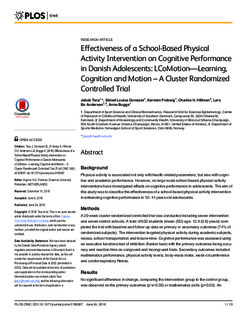| dc.contributor.author | Tarp, Jakob | |
| dc.contributor.author | Domazet, Sidsel Louise | |
| dc.contributor.author | Froberg, Karsten | |
| dc.contributor.author | Hillman, Charles H. | |
| dc.contributor.author | Andersen, Lars Bo | |
| dc.contributor.author | Bugge, Anna | |
| dc.date.accessioned | 2017-02-09T14:04:58Z | |
| dc.date.available | 2017-02-09T14:04:58Z | |
| dc.date.issued | 2016-06-24 | |
| dc.identifier.citation | PLoS ONE. 2016, 11. doi: 10.1371/journal.pone.0158087 | nb_NO |
| dc.identifier.uri | http://hdl.handle.net/11250/2430160 | |
| dc.description.abstract | Background: Physical activity is associated not only with health-related parameters, but also with cognitive and academic performance. However, no large scale school-based physical activity interventions have investigated effects on cognitive performance in adolescents. The aim of this study was to describe the effectiveness of a school-based physical activity intervention in enhancing cognitive performance in 12–14 years old adolescents. Methods: A 20 week cluster randomized controlled trial was conducted including seven intervention and seven control schools. A total of 632 students (mean (SD) age: 12.9 (0.6) years) completed the trial with baseline and follow-up data on primary or secondary outcomes (74% of randomized subjects). The intervention targeted physical activity during academic subjects, recess, school transportation and leisure-time. Cognitive performance was assessed using an executive functions test of inhibition (flanker task) with the primary outcomes being accuracy and reaction time on congruent and incongruent trials. Secondary outcomes included mathematics performance, physical activity levels, body-mass index, waist-circumference and cardiorespiratory fitness. Results: No significant difference in change, comparing the intervention group to the control group, was observed on the primary outcomes (p’s>0.05) or mathematics skills (p>0.05). An intervention effect was found for cardiorespiratory fitness in girls (21 meters (95% CI: 4.4–38.6) and body-mass index in boys (-0.22 kg/m2 (95% CI: -0.39–0.05). Contrary to our predictions, a significantly larger change in interference control for reaction time was found in favor of the control group (5.0 milliseconds (95% CI: 0–9). Baseline to mid-intervention changes in physical activity levels did not differ significantly between groups (all p’s>0.05). Conclusions: No evidence was found for effectiveness of a 20-week multi-faceted school-based physical activity intervention for enhancing executive functioning or mathematics skills compared to a control group, but low implementation fidelity precludes interpretation of the causal relationship. | nb_NO |
| dc.language.iso | eng | nb_NO |
| dc.publisher | PLOS | nb_NO |
| dc.subject | schools | nb_NO |
| dc.subject | physical activity | nb_NO |
| dc.subject | cognitive psychology | nb_NO |
| dc.subject | reaction time | nb_NO |
| dc.subject | teachers | nb_NO |
| dc.subject | adolescents | nb_NO |
| dc.subject | accelerometers | nb_NO |
| dc.subject | body mass index | nb_NO |
| dc.title | Effectiveness of a School-Based Physical Activity Intervention on Cognitive Performance in Danish Adolescents: LCoMotion—Learning, Cognition and Motion – A Cluster Randomized Controlled Trial | nb_NO |
| dc.type | Journal article | nb_NO |
| dc.type | Peer reviewed | nb_NO |
| dc.subject.nsi | VDP::Matematikk og Naturvitenskap: 400::Basale biofag: 470 | nb_NO |
| dc.subject.nsi | VDP::Landbruks- og Fiskerifag: 900::Landbruksfag: 910 | nb_NO |
| dc.source.journal | PLoS ONE | nb_NO |
| dc.identifier.doi | 10.1371/journal.pone.0158087 | |
| dc.description.localcode | Seksjon for idrettsmedisinske fag / Department of Sports Medicine | nb_NO |
